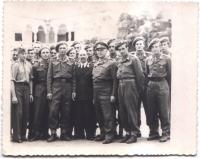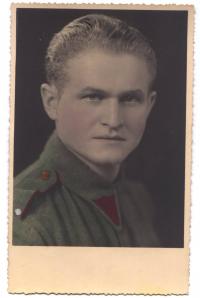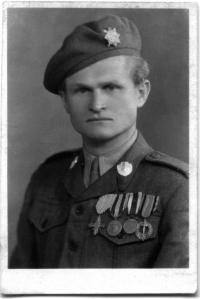“Now they say that a „forced labour camp“ was not the same as prison. And I was in the uranium mine in Příbram! What hard labour was that! And I got nothing for that year…“
Eduard Svobodinský was born on February 10. 1921 in Volhynia. Both parents worked as farmers in the village of Volkov. He acquired elementary education in czech and ukrainian schools and before the war he graduated from an economic- agricultural secondary school. He wanted to stay on his family´s farm - they had 30 hectares of land, which required special knowledge and experience to be managed. In 1944 he voluntarily enlisted in Svoboda´s Czechoslovakian army which was just being formed. He went through training in Bukovina - he was supposed to become a telephonist so he was at first trained in signalling techniques. Later his commander recommended him for an officer´s school where he reached the rank of lance-corporal. The task of Eduard Svobodinský was to maintain connection between the staff and an observation point. He also served as a courier among the Czech, Russian and Romanian staffs. Mr. Svobodinský also fought at the battle of Dukla. Most deaths here were caused by contact mines, that is why a special mine-detecting batallion was formed.After the war Mr. Svobodinský didn´t go back to Volyn, he remained in Czechoslovakia. He served in the army until 1948 as a member of the Prague castle guard. After the coup in February 1948 he refused to swear loyalty to president Gottwald and left the army. In 1950´s he unsuccessfully tried to cross the border and was sentenced to seven months in prison. After being released he was arrested again and sent to forced labour in uranium mines in Příbram. After ten years he was supposed to be decorated on the anniversary of the Dukla operation. He worked at first in JZD (socialistic farms) in Lochotín, then in Škoda factory in Pilsen where he finally retired. He still lives in Pilsen today.



